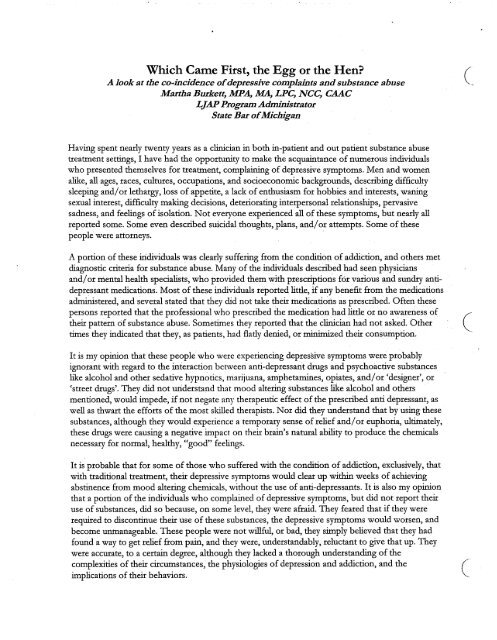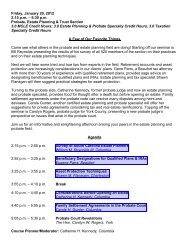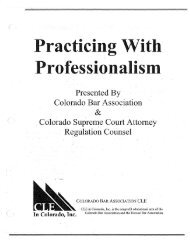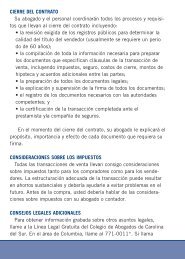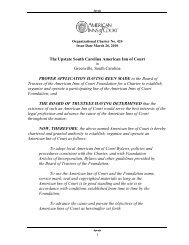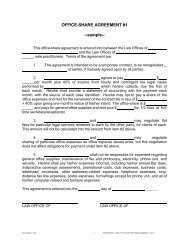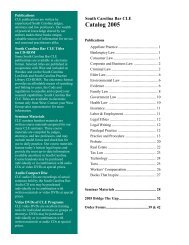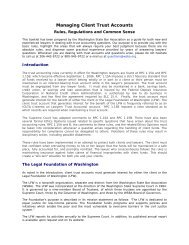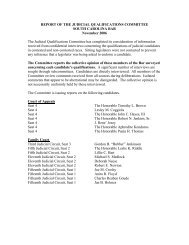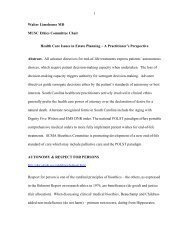Tips and Tools for a Successful Practice - South Carolina Bar ...
Tips and Tools for a Successful Practice - South Carolina Bar ...
Tips and Tools for a Successful Practice - South Carolina Bar ...
Create successful ePaper yourself
Turn your PDF publications into a flip-book with our unique Google optimized e-Paper software.
Which Came First, the Egg or the Hen?<br />
A lookat the co-incidence ofdepressive complaints <strong>and</strong> substance abuse<br />
Martha Burkett, MPA, A!A, LPC, NCe, CAAC<br />
LJAPProgram Administrator<br />
State <strong>Bar</strong>ofMichigan<br />
Having spent nearly twenty years as a clinician in both in-patient <strong>and</strong> out patient substance abuse<br />
treatment settings, I have had the opportunity to make the acquaintance ofnumerous individuals<br />
who presented themselves <strong>for</strong> treatment, complaining of depressive symptoms. Men <strong>and</strong> women<br />
alike, all ages, races, cultures, occupations, <strong>and</strong> socioeconomic backgrounds, describing difficulty<br />
sleeping <strong>and</strong>/or lethargy, loss of appetite, a lack of enthusiasm <strong>for</strong> hobbies <strong>and</strong> interests, waning<br />
sexual interest, difficulty making decisions, deteriorating interpersonal relationships, pervasive<br />
sadness, <strong>and</strong> feelings ofisolation. Not everyone experienced all of these symptoms, but nearly all<br />
reported some. Some even described suicidal thoughts,plans, <strong>and</strong>/or attempts. Some of these<br />
people were attorneys. .<br />
A portion of these individuals was clearly suffering from the condition ofaddiction, <strong>and</strong> others met<br />
diagnostic criteria <strong>for</strong> substance abuse. Many of the individuals describedhad seen physicians<br />
<strong>and</strong>/or mental health specialists, who provided them with prescriptions <strong>for</strong> various <strong>and</strong> sundry antidepressant<br />
medications. Most of these individuals reported litde, if any benefit from the medications<br />
administered, <strong>and</strong> several stated that they did not take their medications as prescribed. Often these<br />
persons reported that the professional who prescribed the medication had lillie or no awareness of<br />
their pattern of substance abuse. Sometimes they reported that the clinician had not asked. Other<br />
times they indicated that they, as patients, had flatly denied, or minimized their consumption.<br />
C<br />
_<br />
It is my opinion that these people who were experiencing depressive symptoms were probably<br />
ignorant with regard to the interaction between anti-depressant drugs <strong>and</strong> psychoactive substances<br />
like alcohol <strong>and</strong> other sedative hypnotics, marijuana, amphetamines, opiates, <strong>and</strong>/or 'designer', or<br />
'street drugs'. They did not underst<strong>and</strong> that mood altering substances like alcohol <strong>and</strong> others<br />
mentioned, would impede, ifnot negate any therapeutic effect of the prescribed anti depressant, as<br />
well as thwart the ef<strong>for</strong>ts of the most skilled therapists. Nor did they underst<strong>and</strong> that by using these<br />
substances, although they would experience a temporary sense of relief <strong>and</strong>/or euphoria, ultimately,<br />
these drugs were causing a negative impact on their brain's natural ability to produce the chemicals<br />
necessary <strong>for</strong> normal, healthy, "good" feelings.<br />
It is probable that <strong>for</strong> some ofthose who suffered with the condition of addiction, exclusively, that<br />
with traditional treatment, their depressive symptoms would clear up within weeks ofachieving<br />
abstinence from mood altering chemicals, without the use of anti-depressants. It is also my opinion<br />
that a portion of the individuals who complained of depressive symptoms, but did not report their<br />
use of substances, did so because, on some level, they were afraid. They feared that if they were<br />
required to discontinue their use of these substances, the depressive symptoms would worsen, <strong>and</strong><br />
become unmanageable. These people were not willful, or bad, they simply believed that they had<br />
found a way to get relief from pain, <strong>and</strong> they were, underst<strong>and</strong>ably, reluctant to give that up. They<br />
were accurate, to a certain degree, although they lacked a thorough underst<strong>and</strong>ing of the<br />
complexities of their circumstances, the physiologies of depression <strong>and</strong> addiction, <strong>and</strong> the (-<br />
implications of their behaviors.


